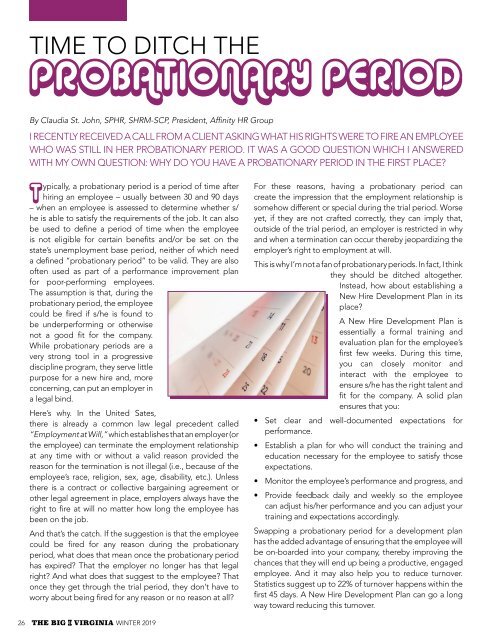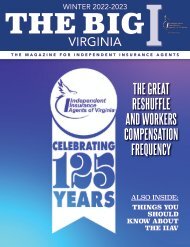The Big I Virginia Winter 2019
You also want an ePaper? Increase the reach of your titles
YUMPU automatically turns print PDFs into web optimized ePapers that Google loves.
TIME TO DITCH THE<br />
PROBATIONARY PERIOD<br />
By Claudia St. John, SPHR, SHRM-SCP, President, Affinity HR Group<br />
I RECENTLY RECEIVED A CALL FROM A CLIENT ASKING WHAT HIS RIGHTS WERE TO FIRE AN EMPLOYEE<br />
WHO WAS STILL IN HER PROBATIONARY PERIOD. IT WAS A GOOD QUESTION WHICH I ANSWERED<br />
WITH MY OWN QUESTION: WHY DO YOU HAVE A PROBATIONARY PERIOD IN THE FIRST PLACE?<br />
Typically, a probationary period is a period of time after<br />
hiring an employee – usually between 30 and 90 days<br />
– when an employee is assessed to determine whether s/<br />
he is able to satisfy the requirements of the job. It can also<br />
be used to define a period of time when the employee<br />
is not eligible for certain benefits and/or be set on the<br />
state’s unemployment base period, neither of which need<br />
a defined “probationary period” to be valid. <strong>The</strong>y are also<br />
often used as part of a performance improvement plan<br />
for poor-performing employees.<br />
<strong>The</strong> assumption is that, during the<br />
probationary period, the employee<br />
could be fired if s/he is found to<br />
be underperforming or otherwise<br />
not a good fit for the company.<br />
While probationary periods are a<br />
very strong tool in a progressive<br />
discipline program, they serve little<br />
purpose for a new hire and, more<br />
concerning, can put an employer in<br />
a legal bind.<br />
Here’s why. In the United Sates,<br />
there is already a common law legal precedent called<br />
“Employment at Will,” which establishes that an employer (or<br />
the employee) can terminate the employment relationship<br />
at any time with or without a valid reason provided the<br />
reason for the termination is not illegal (i.e., because of the<br />
employee’s race, religion, sex, age, disability, etc.). Unless<br />
there is a contract or collective bargaining agreement or<br />
other legal agreement in place, employers always have the<br />
right to fire at will no matter how long the employee has<br />
been on the job.<br />
And that’s the catch. If the suggestion is that the employee<br />
could be fired for any reason during the probationary<br />
period, what does that mean once the probationary period<br />
has expired? That the employer no longer has that legal<br />
right? And what does that suggest to the employee? That<br />
once they get through the trial period, they don’t have to<br />
worry about being fired for any reason or no reason at all?<br />
For these reasons, having a probationary period can<br />
create the impression that the employment relationship is<br />
somehow different or special during the trial period. Worse<br />
yet, if they are not crafted correctly, they can imply that,<br />
outside of the trial period, an employer is restricted in why<br />
and when a termination can occur thereby jeopardizing the<br />
employer’s right to employment at will.<br />
This is why I’m not a fan of probationary periods. In fact, I think<br />
they should be ditched altogether.<br />
Instead, how about establishing a<br />
New Hire Development Plan in its<br />
place?<br />
A New Hire Development Plan is<br />
essentially a formal training and<br />
evaluation plan for the employee’s<br />
first few weeks. During this time,<br />
you can closely monitor and<br />
interact with the employee to<br />
ensure s/he has the right talent and<br />
fit for the company. A solid plan<br />
ensures that you:<br />
• Set clear and well-documented expectations for<br />
performance.<br />
• Establish a plan for who will conduct the training and<br />
education necessary for the employee to satisfy those<br />
expectations.<br />
• Monitor the employee’s performance and progress, and<br />
• Provide feedback daily and weekly so the employee<br />
can adjust his/her performance and you can adjust your<br />
training and expectations accordingly.<br />
Swapping a probationary period for a development plan<br />
has the added advantage of ensuring that the employee will<br />
be on-boarded into your company, thereby improving the<br />
chances that they will end up being a productive, engaged<br />
employee. And it may also help you to reduce turnover.<br />
Statistics suggest up to 22% of turnover happens within the<br />
first 45 days. A New Hire Development Plan can go a long<br />
way toward reducing this turnover.<br />
26 THE BIG VIRGINIA WINTER <strong>2019</strong>

















